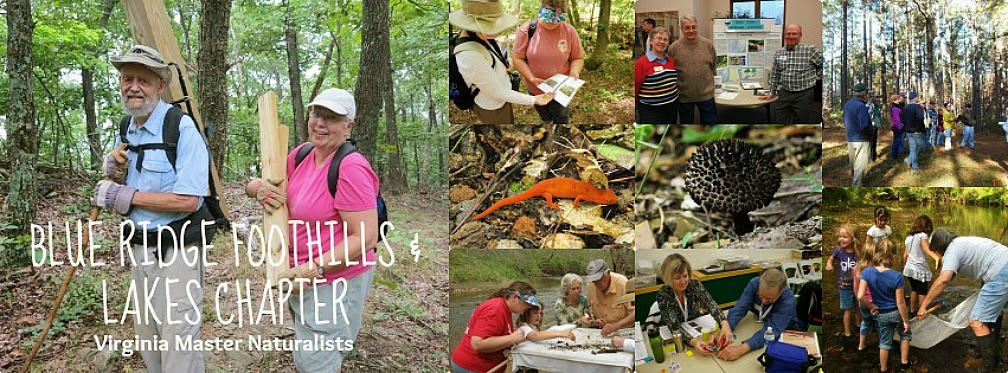The 2016 VMN Conference: Tour of the Bowman’s Dairy Operation
As part of the Virginia Master Naturalist 2016 State Conference in Franklin County, VA, Delmar Bowman provided an enlightening tour of the Sunny Dell Dairy Farm in Wirtz, VA on August 27, 2016. Delmar was joined by another younger male family member for the tour.
The Farming Process
The Bowmans have been practicing no-till farming for 20 years. They currently grow corn, sorghum, and soybeans. They have 300 owned acres and 200 rented acres. Some of the output is used in the dairy process (as feed - silage), but much is sold as a cash crop. They still have one tractor from the early 1970s (it is Eugene’s, Delmar’s brother), but Delmar said the engine is just about gone now. It gave out last week. Each member of the family has their own responsibilities on the farm. Eugene runs the dairy operation. Delmar runs the farming operations. The Bowmans keep up with new farming techniques through conferences.
Occasional experimentation with new techniques seems to be the norm for the Bowmans. Delmar is now trying the no-till approach in his vegetable garden. He is not quite sure how well that is working, but the garden certainly looked very productive.
The Benefits of No-till Farming
Mr. Bowman provided a handout listing 10 benefits of no-till compared to plowing. No-till saves gasoline, time, money, and reduces erosion. The soil is enriched by decayed herbaceous material. The Bowmans provided a demonstration of soil water permeability and solubility that showed the advantages of no-till soils relative to constantly tilled garden soil. Roots grow deeper in no-till soils and water flows more readily through such soil. Delmar explained that tilling reduces the “glue” in soil that keeps it from becoming both too water soluble and impermeable to rain deposition. They are quite convinced that no-till is the best approach for their land.
 |
| Delmar describes the no-till |
 |
| The Bowmans demonstrate |
Silage from the farming process is kept both in silos and in plastic bags that promote fermentation of the feed. They prefer to use the silage after about 5-6 months for optimal fermentation level.
The Dairy Operation
The Bowmans own about 150 Holstein cows (a pure guess based on my observation). Perhaps 100 are milk-producers at any one time, others are pregnant and are dry for a few months prior to giving birth. The dry cows live in a separate barn and are free to graze in a field, while the milk-producing dairy cattle remain in an enclosed area that is cooled with many fans and water mists. The cattle are treated as the valuable assets they are. The productive life of a dairy cow can vary a lot, but 6 years is an average life, before their production falls to a point where they are retired from production. Detailed records are kept on the output of each cow, which are identified by ear tags and freeze brand numbers.
 |
| A freeze branded Holstein |
The cows are kept almost permanently pregnant. The farmers target for artificial insemination a couple of weeks following birth. (Natural insemination is both dangerous and less efficient). The calves are housed separately in individual plastic houses and pens. They are weaned quickly. Males are typically sold.
 |
| Housing for the calves |
The cow milking process requires 3.5 hours (given the size of the heard) and is typically done 3 times per day. The Bowman’s have about 14-16 mechanized milking stations. (I failed to count them). The milk flows from the milking stations via PVC pipes into a vat and is then pumped into two large holding tanks. The milk is picked up by a tank truck every two days.
A large quantity of manure is produced as a by-product of the dairy operation and it is constantly moved from the living area into a manure trap. The twelve foot deep manure trap (about 50 x 50 ft) was nearly full at the time of our visit. The manure can be pumped out if it is wet enough. A pond provides additional moisture if needed for pumping. The manure is typically spread on the fields to enrich the soil.
 |
| Delmar explains manure |
From discussions with our hosts, it seems that farming
requires continually having to solve unexpected problems that occur with
cattle, equipment, or nature. That is
the life. We learned a lot about farming and dairy
operations in a brief time by seeing the facilities in person with the tutelage
of an expert. A book could never provide
the same level of insight in a two hour period.
AN ASIDE: Shade is nice when it is well over 90 degrees. The coolest spot on the farm (by far) was below the mist fans where the milk-producing dairy cattle live. On this family farm, the men wear long pants and hats, while the women wear long dresses. The Bowmans are clearly tougher than most of the Master Naturalists.
Submitted by Paul and Beth Pautler


No comments:
Post a Comment
Thanks for your comment and interest! NOW GO OUTSIDE!